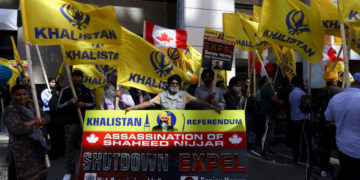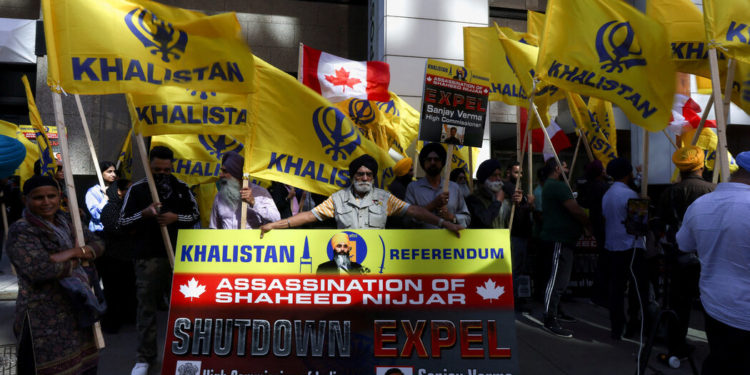Canada accused the Indian government on Monday of homicide and extortion intended to silence critics of India living in Canada, escalating a bitter dispute that began last year with an assassination of a Sikh activist.
Canada expelled India’s top diplomat and five others, saying they were part of a vast criminal network. India reciprocated, expelling six Canadian diplomats.
The two countries have been in an intense dispute following the assassination of a prominent Sikh cleric, Hardeep Singh Nijjar, which Mr. Trudeau’s government said at the time had been orchestrated by the Indian government.
Canada is home to the largest Sikh community outside India, a religious minority that lives mostly in the state of Punjab, in northwestern India.
India has said that some Sikhs in Canada are actively involved in a secessionist movement that seeks to carve out a Sikh homeland, known as Khalistan. Canadian officials said their investigations focused on the Indian government’s involvement in a campaign aimed at Canadian Sikh activists.
Melanie Jolly, Canada’s foreign minister, said in a statement that Canada had issued expulsion orders on Monday to the six diplomats — including Sanjay Kumar Verma, India’s high commissioner, or ambassador, in Canada — after the Indian government refused to waive their diplomatic immunity for them to participate in Canada’s investigations.
She said that Canada’s law enforcement agencies had identified the six as “persons of interest” in the case of the assassination of Mr. Nijjar.
“The decision to expel these individuals was made with great consideration,’’ Ms. Jolly said, adding that investigators had “gathered ample, clear and concrete evidence.’’
Mr. Nijjar was ambushed and killed by three masked men outside a Sikh temple in Surrey, British Columbia, where he served as president. Three Indian nationals have been arrested and charged in the continuing investigation.
The Indian government, in its own statement on Monday, sought to dispute Canada’s claim, saying it was pulling its diplomats out of Canada because of “an atmosphere of extremism and violence,” which it said endangered their safety.
The Indian government also said it was expelling six Canadian diplomats from India, including the embassy’s second-highest ranking diplomat, the chargé d’affaires, Stewart Wheeler.
India maintains that the allegations against it are politically motivated, and accuses Canada’s prime minister, Justin Trudeau, of being in cahoots with Sikh separatists because they support his Liberal Party.
The Indian government has vehemently denied the accusations that it was involved in the killing of the cleric, and has claimed that Prime Minister Trudeau is pandering to Canada’s large Sikh community for political gain.
Canada’s top law enforcement official, Mike Duheme, on Monday presented stark accusations against the Indian government, saying that it had set up a criminal network inside Canada to harass and intimidate Sikhs, though he provided few specifics about the crimes.
The investigation, Mr. Duheme said, had also been assisted by the F.B.I.
“An extraordinary situation is compelling us to speak about what we have discovered in our multiple ongoing investigations into the involvement of agents of the government of India in serious criminal activity in Canada,” said Mr. Duheme, the Royal Canadian Mounted Police Commissioner.
He added that the police were taking the unusual step of going public “due to significant threat to public safety in our country.”
Mr. Duheme said that his officers had investigated and charged “a significant number of individuals for their direct involvement in homicides, extortions and other criminal acts of violence.
There had been more than a dozen credible threats to life against members of the Sikh community in Canada.
While he did not detail the means the Canadian authorities had used to collect evidence against the Indian government and its agents, Mr. Duheme said that their investigations had revealed that it was running a major intelligence-gathering network in Canada using paid individuals.
Others were forced to help through coercion, Mr. Duheme said.
“The information collected by the government of India is then used to target members of the South Asian community,” he said.
The accusations made by Mr. Duheme would amount to serious breaches of law and norms of the conduct of a government in another nation’s territory.
India’s intelligence services have long been accused of directing targeted killings of opponents inside neighboring countries.
Canada’s accusations against India regarding the assassination of Mr. Nijjar were bolstered by a United States investigation into a similar, unsuccessful plot against a U.S.-based Sikh cleric.
The deepening rift between India and Canada comes as the United States, the European Union and other allies of Canada try to court India as a counterweight to Russia on the world stage.
The fresh charges against India also arise as a Canadian commission is investigating the interference of foreign powers into domestic politics.
A Canadian parliamentary report in June, based on information provided by the country’s intelligence services, identified China and India as the two countries that pose the biggest risk of foreign interference.
Mr. Kumar Verma, had described the report as politically motivated and dismissed its findings.
The Indian government on Monday expressed its full support for Mr. Kumar Verma. “The aspersions cast on him by the Government of Canada are ludicrous and deserve to be treated with contempt,” it said.
The post Canada Expels Indian Diplomats, Linking Them to Criminal Campaign appeared first on New York Times.



















